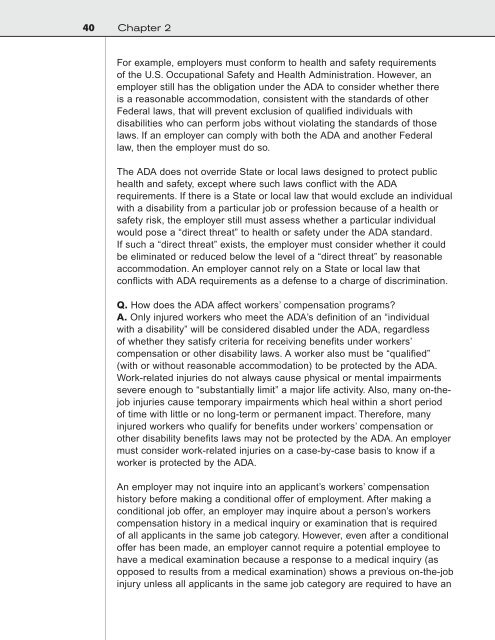Design for Accessibility: A Cultural Administrator's Handbook
Design for Accessibility: A Cultural Administrator's Handbook
Design for Accessibility: A Cultural Administrator's Handbook
Create successful ePaper yourself
Turn your PDF publications into a flip-book with our unique Google optimized e-Paper software.
40 Chapter 2<br />
For example, employers must con<strong>for</strong>m to health and safety requirements<br />
of the U.S. Occupational Safety and Health Administration. However, an<br />
employer still has the obligation under the ADA to consider whether there<br />
is a reasonable accommodation, consistent with the standards of other<br />
Federal laws, that will prevent exclusion of qualified individuals with<br />
disabilities who can per<strong>for</strong>m jobs without violating the standards of those<br />
laws. If an employer can comply with both the ADA and another Federal<br />
law, then the employer must do so.<br />
The ADA does not override State or local laws designed to protect public<br />
health and safety, except where such laws conflict with the ADA<br />
requirements. If there is a State or local law that would exclude an individual<br />
with a disability from a particular job or profession because of a health or<br />
safety risk, the employer still must assess whether a particular individual<br />
would pose a “direct threat” to health or safety under the ADA standard.<br />
If such a “direct threat” exists, the employer must consider whether it could<br />
be eliminated or reduced below the level of a “direct threat” by reasonable<br />
accommodation. An employer cannot rely on a State or local law that<br />
conflicts with ADA requirements as a defense to a charge of discrimination.<br />
Q. How does the ADA affect workers’ compensation programs?<br />
A. Only injured workers who meet the ADA’s definition of an “individual<br />
with a disability” will be considered disabled under the ADA, regardless<br />
of whether they satisfy criteria <strong>for</strong> receiving benefits under workers’<br />
compensation or other disability laws. A worker also must be “qualified”<br />
(with or without reasonable accommodation) to be protected by the ADA.<br />
Work-related injuries do not always cause physical or mental impairments<br />
severe enough to “substantially limit” a major life activity. Also, many on-thejob<br />
injuries cause temporary impairments which heal within a short period<br />
of time with little or no long-term or permanent impact. There<strong>for</strong>e, many<br />
injured workers who qualify <strong>for</strong> benefits under workers’ compensation or<br />
other disability benefits laws may not be protected by the ADA. An employer<br />
must consider work-related injuries on a case-by-case basis to know if a<br />
worker is protected by the ADA.<br />
An employer may not inquire into an applicant’s workers’ compensation<br />
history be<strong>for</strong>e making a conditional offer of employment. After making a<br />
conditional job offer, an employer may inquire about a person’s workers<br />
compensation history in a medical inquiry or examination that is required<br />
of all applicants in the same job category. However, even after a conditional<br />
offer has been made, an employer cannot require a potential employee to<br />
have a medical examination because a response to a medical inquiry (as<br />
opposed to results from a medical examination) shows a previous on-the-job<br />
injury unless all applicants in the same job category are required to have an


